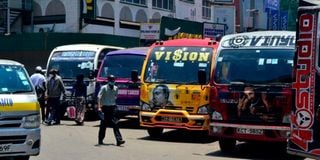Premium
Matatu fares to increase from today as costly fuel takes toll

Matatus wait for passengers at Commercial terminus on Tom Mboya Street in Nairobi in September 2020.
Public Transport Vehicle (PSV) operators have adjusted fare upwards by 20 percent as last week's fuel hike continues to hit Kenyan consumers.
The Federation of Public Transport Sector says the countrywide fare hike starting today will affect all PSV operating across the country to factor in the recent fuel prices.
The Energy and Petroleum Regulatory Authority (Epra) last week increased pump prices by Sh9 per litre pushing the cost of super and diesel to Sh159.12 and Sh140, respectively in Nairobi — the highest in Kenya’s history.
Kerosene prices also went up by a similar margin and will now retail at Sh127 in Nairobi.
“The federation hereby resolves that with effect from Monday, June 20, 2022 fares payable on public transport vehicles countrywide shall be adjusted upwards by 20 percent,” said lobby’s chairman Edwins Mukabanah.
The latest rise will see petrol prices increase by Sh24 per litre in just three months, the highest increase in the cost of diesel and super in three months since Kenya started setting pump prices.
The record prices will unleash inflationary pressure on the cost of living as manufacturers of goods, transporters and service providers pass the increased cost of fuel to the consumers.
The increase in fuel prices means that a passenger from Zimmerman to Nairobi’s central business district will pay Sh70 up from Sh60.
Those commenting from Rongai to Nairobi will part up to Sh120 down from Sh 100 they normally pay on the route especially when demand for transport is high.
Mr Mukabanah said the lobby group composed of members such as Matatu Owners Association and Association of Bus Operators Kenya had to adjust PSV fares since PSV transport sector has not recovered from the effects of Covid -19 pandemic.
The sector, he said has also been incurring more in Labour costs since the minimum wage was increased by 12 percent on Labour Day.
President Uhuru Kenyatta ordered a 12 percent rise on minimum monthly wages despite protests from employers, offering relief to workers who had gone for three years without a salary review.
The order which largely benefited low-cadre workers such as cashiers, drivers, guards, cleaners, salespersons and property caretakers took effect on May 1.




